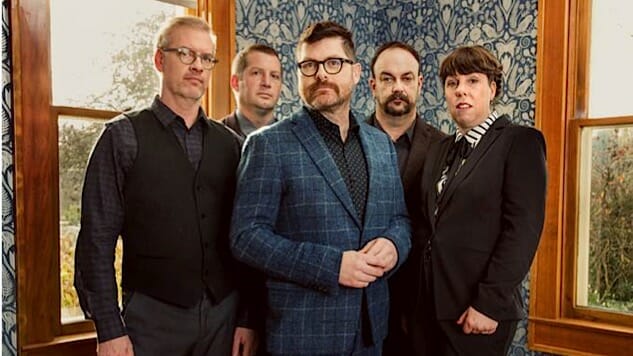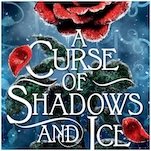The Decemberists Make the Album of Their Lives With I’ll Be Your Girl
They could have gone into hyperdrive after the success of 2011's "The King Is Dead." Instead, they receded from view for years and came back with a new sound.
Photo courtesy of Capitol
The Decemberists could have been contenders. The King Is Dead, the quintet’s third major-label album and sixth overall, debuted at no. 1 on the Billboard pop album charts upon its release in January of 2011. The album’s first single, “Down by the Water,” was nominated for a Grammy. These five Oregon misfits might have become another U2 or R.E.M., a guitar-based rock band defying the climate of a microchip era to become superstars.
“Who knows might have happened if we’d really capitalized on the success of The King Is Dead?” says the band’s lead singer and chief songwriter, Colin Meloy. “A lot of bands would have followed up on it with a lot of activity. We took a four-year break. The success was a surprise and exciting, because we’d never expected it. We were glad to have larger audiences each time we went out on the road, but I realized I didn’t feel comfortable in that category of being a big band.”
Read Paste’s review of I’ll Be Your Girl here
“The King Is Dead definitely gave us more mainstream credibility,” adds the band’s keyboardist, Jenny Conlee. “We went to the Grammies, and we felt, ‘Oh, we’re part of the big kids now.’ But we never felt we had to play any differently.”
“I wouldn’t call them protest songs necessarily, but I was definitely feeling that climate,” says Meloy. ‘Severed’ is definitely from a demagogue’s viewpoint. We can all find the devastator in ourselves, so in that sense I can be the person in ‘Severed.’ That’s the reason Donald Trump is president, because there’s a little of him in all of us, in America itself.”
The Decemberists were contending for something else. They didn’t want to be chased down the street by screaming fans as The Beatles and Michael Jackson were; they didn’t want to tour with a fleet of tractor trailers. They were more interested in being an act like The Byrds or Elvis Costello: artists who could combine traditional roots, smart lyrics and weird muso twists, always changing up their sound every few years but managing to hold onto an audience large enough to keep them out of the clubs and in the theaters if not the basketball arenas.
That’s just what they’ve done. Their new album, I’ll Be Your Girl,, out March 16 on Capitol Records, puts a new sonic spin on familiar, fable-like songs. Working for the first time with John Congleton, producer for St. Vincent, Angel Olsen and Future Islands, The Decemberists have brought the synthesizers from the background to the foreground, adding an ominous sizzle to Meloy’s compositions about a world taking a turn for the worse. The album sounds less like Fairport Convention and more like New Order.
“When I was 13,” Meloy recalls, “New Order, R.E.M. and the Smiths were huge for me. I like New Order’s early stuff the best when they were these punk kids who had just discovered dance music and were figuring out for themselves how to marry dance tracks and synthesizers to guitar and bass. There was this shambolic quality to it that I liked. I’ve always been skeptical of virtuosity, perhaps because I’ve never been able to be a virtuoso myself. I like the guitar solos on Jesus and Mary Chain for the same reason, because they sound like they’re figuring it out as they play.”
The sound of I’ll Be Your Girl is all the more surprising because it comes in the wake of a very different project. Last year the five Decemberists joined English folk singer Olivia Chaney to form a band they called Offa Rex, a deliberate emulation of such British folk-rock bands as Fairport Convention, Steeleye Span and the Albion Dance Band. The spin-off group released an album called Queen of Hearts, containing eight traditional English folk ballads and three standards from the English folk-rock movement. (You can read Paste’s review here.) For this record, the signature instrument was not a synthesizer but Chaney’s harmonium, the 19th-century, box-sized, hand-operated pump organ.
“Offa Rex came out of the same need to change things up as this new album,” Meloy says. “English folkdom was a discovery I made in my late 20s and early 30s, and it made me feel like a crate-digging teenager again. Discovering this whole new world was like discovering The Replacements a decade and a half earlier. I was listening to Albion Dance Band and wishing I could be in that band. I was thinking, ‘A band should do this music,’ and I realized I had a band that could do that, and I knew someone who could sing those songs really well. But having gone through the Offa Rex experience, I’m giving those records a break for a while. Now I have an opportunity to explore other parts of my record collections, like New Order, Roxy Music and the Cure.”
After the hiatus following The King Is Dead, the Decemberists had reconvened in 2014 to record What a Terrible World, What a Beautiful World, which was released in January of 2015. The first song was “The Singer Addresses His Audience,” a typical Meloy composition that uses humor to explore a serious topic, in this case the complicated relationship between performers and their audience. “We know we belong to you,” he sang. “We know you threw your arms around us in the hopes we wouldn’t change, but we had to change some, you know, to belong to you.”
“I don’t want to throw that record under the bus to promote this one,” Meloy insists, “but the first song was about the need to change, and then the rest of the record was more of what we always do. I don’t know that we got to the point where someone needed to stage an intervention, but I’m a restless creative person. I’m most happy when I have things on the horizon that feel different and challenging. On the last record, the songs just fell into place, which can be a good thing, because it means they’re happening naturally, but it can also be a bad thing. I thought, ‘If we want to do something different, a new producer would be a good place to start.’”
“On the one hand, as we grow with each other, I think we play better because we know each other’s patterns,” adds Conlee. “On the other hand, the hard part is finding that freshness we had when we started. So bringing in a new producer was a way to inject a fresh perspective without throwing out that easy communication after playing together for 13 years.”
Over the years Conlee has collected all kinds of keyboards: accordions, organs, synths, moogs and vibraphones. Chris Funk, the band’s fretted-string specialist, is even more of a collector, amassing all manner of guitars, banjos, mandolins, bouzoukis, pedals, effects and amps. Congleton encouraged them to haul all their gear into the studio so they’d have more sounds to choose from. The Decemberists had been playing one of the new songs, “We All Die Young,” at their live shows before they went into the studio. Meloy’s lyric describes a dream where Civil War general William Tecumseh Sherman tells him, in perfect German, that “we all die young.” Like many of the new songs, it walks atop the fence between its serious subject matter and its irreverent tone. The way it morphed in the studio is perhaps the best example of the band’s different approach on this project. “I’d originally written it as a Leonard Cohen rave-up,” Meloy recalls, “and we played it live a lot. By the time we came to the studio, it was this bluesy ramble that no one liked. John Congleton suggested, ‘Why don’t we throw some Gary Glitter on it?’ Everyone got excited and it fell into place quickly.”
People are already talking about I’ll Be Your Girl as the Decemberists’ synthesizer album, but the fact remains that six of the 11 songs begin with a lone acoustic guitar and voice—and a seventh song begins with a lone acoustic piano and voice. It’s as if these seven tracks begin with the sound of Meloy’s original home demo and only gradually add instruments to build into a much larger, much more electronic climax. It’s as if these numbers begin in the band’s past and move into its future.
Read: The 11 Best Songs by The Decemberists
“Opening the songs with a lone acoustic guitar is probably a hangover from old habits,” Meloy says, “but it’s also the way Decemberists songs work. That’s the challenge: You want it to change, but you want it to still sound like us. I’m not remotely prepared to disavow our earlier music. We didn’t want to demolish our past; we wanted this album to fit in with our other records.”
The album begins on a serious note. The short opening track, “Once in My Life,” is a forlorn request to the universe that for just once in his life, could something go right? It builds from its bare-bones opening to a wall-of-sound anthem featuring female vocals and John Moen’s thundering drums. The second song, “Cutting Stone,” begins the same way as it spins a fable about a violent man who uses his sharpened tool to “free” a homeless youth and a grieving widower from the burdens of living. The music, full of Nate Query’s throbbing bass and Conlee’s watery synths, is as chilly and austere as the tale.
Another murderous avenger is the narrator of “Severed,” the album’s first single, which begins with pulsing synths and beats right from the start. A political/religious zealot announces, “I alone am the answer; I alone will make wrongs right,” and vows to wipe out all contradictions to those claims. The growing power of the propulsive music behind him reinforces his threat.
“The political climate influenced a lot of the writing,” Meloy acknowledges. “I wouldn’t call them protest songs necessarily, but I was definitely feeling that climate. ‘Severed’ is definitely from a demagogue’s viewpoint. We can all find the devastator in ourselves, so in that sense I can be the person in ‘Severed.’ That’s the reason Donald Trump is president, because there’s a little of him in all of us, in America itself. But there’s also a hope for change in these songs.”
But after the first half of the record has been as ominous as its lyrics, the tone suddenly changes on the sixth track, “Your Ghost.” The words describe another nighttime predator, but this time the music doesn’t reinforce the menacing mood but instead undermines it. The uptempo indie-rock attack pushes forward Meloy’s voice as the scary goblin, but he is soon mocked by the “la, la, la” female vocals, the harpsichord solo and cheesy guitar solo. It’s as if the band were saying, “Hey, wait a minute, these monsters in our lives are just a bunch of clowns.”
“That’s a thing I’ve often traded in: marrying dark lyrics to upbeat music,” Meloy explains. “It’s part of the tradition of pop songwriting. I know the songs are funny when I’m writing them, but I like that the darkness and humor are sometimes hard to tell apart. Laughing at the apocalypse is a way people are coping right now, laughing at the absurdity of it.”
Something similar happens on “Everything Is Awful,” an English music-hall number where the doom-saying lead vocal is undercut by the chirpy female vocals and arena-rock guitar riffs. The harbinger of death on “We All Die Young” is countered by the comic exaggeration of the sax and synth solos at the end. On “Sucker’s Prayer,” a wonderful impersonation of the early-‘70s Band, the narrator tries to commit suicide by filling his pockets with rocks and wading into a river like Virginia Woolf. But the current sweeps away his pants, leaving him comically stranded in the cold current with nothing but his underwear.
Every Decemberists song begins with Meloy writing alone at home, but this time there were two important differences. One, he allowed the sour political mood of the nation to seep into his writing, and two, he was more aggressive about editing the songs. “This combination of angst and humor is just a way to make sense of what’s happening right now,” he says. “Right after the election, everyone’s impulse was to hold their head in their hands or hide under a blanket. But eventually, people realized how ridiculous these guys were. It’s not like I see it all as a joke; we need to organize ourselves and make sure we vote these guys out. We need to take the situation seriously but not too seriously.”
Meloy and his wife Carson Ellis, an illustrator who designs the band’s albums, have collaborated on a series of children’s books: 2011’s Wildwood, 2012’s Under Wildwood, 2014’s Wildwood Imperium and 2017’s The Whiz Mob and the Grenadine Kid. He worked on the texts with an editor at Harper Collins, Donna Bray. It was his first time working with an editor, and he found it less painful and more helpful than he’d expected.
“Songwriters are used to working in isolation,” he says. “If you suggested they use an editor, they would say, ‘How dare you?’ But editing can help a lot. So on this batch of songs, I was trying to be more critical of the songs, to be a better editor. I started thinking, ‘What would Donna think of this?’ I was asking myself, ‘Does this word convey what I want?’
“When I talk about editing, it’s more about saying this song doesn’t work, or this stanza doesn’t belong here. This song doesn’t need a bridge; that song does. If I have a fault as a songwriter, it may be going on a little too long, so it was a good experience to aim for something economical. Even later, in the studio, John would ask, ‘What’s going on in this verse; do we really need it?’”
“I don’t know that we got to the point where someone needed to stage an intervention, but I’m a restless creative person. I’m most happy when I have things on the horizon that feel different and challenging. On the last record, the songs just fell into place, which can be a good thing, because it means they’re happening naturally, but it can also be a bad thing.”
While Meloy was working on his children’s books, his songwriting and low-profile solo records and tours during the Decemberists’ off-time, his bandmates were staying busy too. The other four members joined singer/violinist Annalisa Tornfelt and guitarist Jon Neufeld in a band called Black Prairie. Combining every kind of string-band music from bluegrass and old-timey to klezmer and gypsy, the sextet released five albums between 2010 and 2014. “Black Prairie was a collective,” Conlee says, “where we all wrote. It was more of a muso band where we could play around with strange chords and all these genres: a musette, a stomp, anything. The Decemberists are totally different. It’s getting a piece of music and trying to arrange it. And Colin has the final say; he calls himself a benevolent dictator.”
Black Prairie is now retired, but Conlee co-founded a Portland band called Echo Echo Echo, a trio of three women who all play keyboards and sing interpretations of ‘60s and ‘70s songs. Moen has a band called Eyelid that plays his original pop songs. Funk curates a stage at the Newport Folk Festival every year. Conlee, Funk, Moen and Query all play sessions for other artists.
But the Decemberists is the main concern for these five musicians—and for the two female vocalists who have been de facto members onstage and in the studio since 2015: Kelly Hogan and Nora O’Connor Kean. These two women, who maintain their own solo careers as well, play a crucial role on the new album of supplying the humor where needed and of humanizing the massive wall of electronic instruments.
“During What a Terrible World, What a Beautiful World,” Meloy says, “I was on such a Leonard Cohen kick that I fantasized about having these female vocalists. They make the sound so much more consistent and they help the build. Good pop songwriting is all about build. You have these simple ideas and relatively simple chords to work with in a short period of time, so any tools you have to help build are invaluable.”
The band’s North American tour is set to begin March 22 in Pomona, Calif., and it climaxes in August with Traveler’s Rest, a two-day festival in Missoula, Mont., curated by the band. In June, they’ll release I’ll Be Your Girl: The Exploded Version, with four bonus tracks—leftover tracks from the sessions that didn’t make it onto the single-disc version released in March.
The Decemberists have found that sweet spot in the pop-music universe. They’re famous enough to play the summer sheds and to pursue odd tangents such as Offa Rex and Traveler’s Rest, but not so famous that they have to keep repeating themselves to pay for a huge supporting organization. They’re willing to pursue new sounds, new subject matter and new projects, but they have a clear enough identity that the results always sound like The Decemberists. They boast an unusually gifted singer-songwriter who’s been willing and able to keep together a stable line-up of sympathetic musicians for 13 years. This kind of a rock ‘n’ roll band wasn’t supposed to exist anymore, but it does.








































